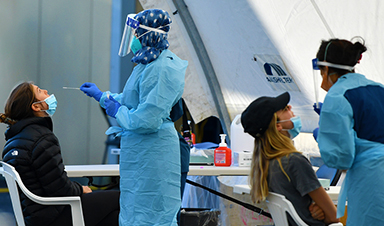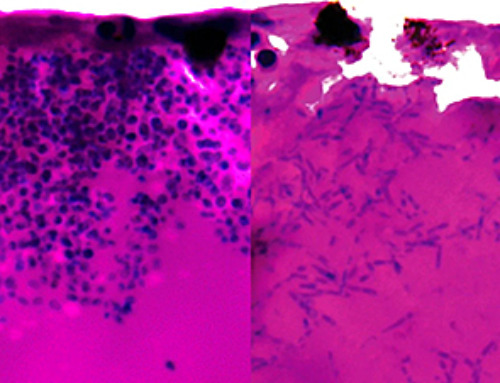If you’ve been worried by recent news stories about a strain of covid called “delta plus,” it may freak you out to hear that scientists just expanded the delta family from four variants to 13.
Please take a deep breath. Scientists would really like you to understand that there’s no evidence delta has learned any new tricks, and these new names are for helping keep track of covid’s evolution—not nine new reasons to panic. And many researchers are also really, really hoping you’ll stop saying “delta plus.”
“The name ‘delta plus’ is completely incorrect, because it gives the perception that this will cause more damage,” says Anderson Brito, a member of the Pango Lineage Designation Committee, which assigns scientific names like B.1.1.7 to new branches of the virus. “So far, we have no evidence any of the mutations affect behavior compared to the original delta variant.”
It might be helpful to think of covid as a tree. Delta is like a thick branch on that tree—a big family of viruses that share a common ancestor and some of the same mutations, which let them spread between people more quickly. When the big branch grows new twigs, which happens all the time, scientists keep track by using technical names that include numbers and letters. But a new scientific name doesn’t mean those viruses will act any differently from the branch they grew from—and if one of those new branches does start to change its behavior, it gets a new Greek letter, not a “plus.”
(Now is a good time to note that while some of delta’s mutations make it more transmissible, vaccines are still very good at preventing severe illness from every known strain of covid.)
What’s in a name?
This naming confusion stems mostly from the way journalists (and their scientist sources) have blended two commonly used systems of tracking covid’s evolution—despite the fact that the approaches have very different strategies and goals.
The alphanumeric system that gave the first delta variant its scientific name—B.1.617.2—is called Pango. It’s meant for researchers tracking small genetic changes to the virus. It doesn’t determine whether new lineages act differently in people, just whether they’re different on a molecular level. There are currently over 1,300 Pango lineages, 13 of which are considered part of the delta family.
The name delta, meanwhile, comes from the WHO system, which is meant to simplify genomics for the general public. It gives names to related covid samples if it believes they may be of particular interest. There are currently eight families with Greek letters, but until there’s evidence a new sublineage of the first delta strain is acting differently from its parents, the WHO considers them all to be delta.
“Delta plus” takes the WHO designation and mixes it up with Pango’s lineage information. It doesn’t mean the virus is more dangerous or more concerning.
“People get quite anxious when they see a new Pango name. But we should not be upset by the discovery of new variants. All the time, we see new variants popping up with no different behavior at all,” says Brito. “If we have evidence a new lineage is more threatening, WHO will give it a new name.”
Tracking evolution
“For a genomic scientist like me, I want to know what variations we’re seeing,” says Kelsey Florek, senior genomics and data scientist for the Wisconsin state public health lab. “For the greater public, it doesn’t really make a difference. Classifying them all as delta is sufficient for communicating with policy makers, public health, and the public.”
Fundamentally, viral evolution works like any other kind. As the virus spreads through the body, it makes copies of itself, which often have small mistakes and changes. Most of these are dead ends, but occasionally, a copy with a mistake replicates enough inside a person to spread to someone else.
As the virus spreads from person to person, it accumulates those small changes, allowing scientists to follow patterns of transmission—the same way we can look at human genomes and identify which people are related. But in a virus, most of those genetic changes have no impact on the way it actually affects individuals and communities.
Genomic scientists still need a way to track that viral evolution, though, both for basic science and to identify any changes in behavior as early as possible. That’s why they are keeping a close eye on patterns in delta, especially, since it’s spreading so rapidly. The Pango team continues to split descendants of the first delta lineage, B.1.617.2, into subcategories of related cases.
Until recently, it had registered 617.2 itself plus three “children,” called AY.1, AY.2, and AY.3. This week, the team decided to split those children into 12 families in order to better track small-scale local changes—hence the total of 13 delta variants. None of this means the virus itself has suddenly changed.
“Especially at the margins, with these emerging variants, you are splitting hairs,” says Duncan MacCannell, chief scientific officer of the CDC’s Office of Advanced Molecular Detection. “Depending on how those definitions are crafted and refined, the hairs can split in different ways.”
News
Scientists Unlock a New Way to Hear the Brain’s Hidden Language
Scientists can finally hear the brain’s quietest messages—unlocking the hidden code behind how neurons think, decide, and remember. Scientists have created a new protein that can capture the incoming chemical signals received by brain [...]
Does being infected or vaccinated first influence COVID-19 immunity?
A new study analyzing the immune response to COVID-19 in a Catalan cohort of health workers sheds light on an important question: does it matter whether a person was first infected or first vaccinated? [...]
We May Never Know if AI Is Conscious, Says Cambridge Philosopher
As claims about conscious AI grow louder, a Cambridge philosopher argues that we lack the evidence to know whether machines can truly be conscious, let alone morally significant. A philosopher at the University of [...]
AI Helped Scientists Stop a Virus With One Tiny Change
Using AI, researchers identified one tiny molecular interaction that viruses need to infect cells. Disrupting it stopped the virus before infection could begin. Washington State University scientists have uncovered a method to interfere with a key [...]
Deadly Hospital Fungus May Finally Have a Weakness
A deadly, drug-resistant hospital fungus may finally have a weakness—and scientists think they’ve found it. Researchers have identified a genetic process that could open the door to new treatments for a dangerous fungal infection [...]
Fever-Proof Bird Flu Variant Could Fuel the Next Pandemic
Bird flu viruses present a significant risk to humans because they can continue replicating at temperatures higher than a typical fever. Fever is one of the body’s main tools for slowing or stopping viral [...]
What could the future of nanoscience look like?
Society has a lot to thank for nanoscience. From improved health monitoring to reducing the size of electronics, scientists’ ability to delve deeper and better understand chemistry at the nanoscale has opened up numerous [...]
Scientists Melt Cancer’s Hidden “Power Hubs” and Stop Tumor Growth
Researchers discovered that in a rare kidney cancer, RNA builds droplet-like hubs that act as growth control centers inside tumor cells. By engineering a molecular switch to dissolve these hubs, they were able to halt cancer [...]
Platelet-inspired nanoparticles could improve treatment of inflammatory diseases
Scientists have developed platelet-inspired nanoparticles that deliver anti-inflammatory drugs directly to brain-computer interface implants, doubling their effectiveness. Scientists have found a way to improve the performance of brain-computer interface (BCI) electrodes by delivering anti-inflammatory drugs directly [...]
After 150 years, a new chapter in cancer therapy is finally beginning
For decades, researchers have been looking for ways to destroy cancer cells in a targeted manner without further weakening the body. But for many patients whose immune system is severely impaired by chemotherapy or radiation, [...]
Older chemical libraries show promise for fighting resistant strains of COVID-19 virus
SARS‑CoV‑2, the virus that causes COVID-19, continues to mutate, with some newer strains becoming less responsive to current antiviral treatments like Paxlovid. Now, University of California San Diego scientists and an international team of [...]
Lower doses of immunotherapy for skin cancer give better results, study suggests
According to a new study, lower doses of approved immunotherapy for malignant melanoma can give better results against tumors, while reducing side effects. This is reported by researchers at Karolinska Institutet in the Journal of the National [...]
Researchers highlight five pathways through which microplastics can harm the brain
Microplastics could be fueling neurodegenerative diseases like Alzheimer's and Parkinson's, with a new study highlighting five ways microplastics can trigger inflammation and damage in the brain. More than 57 million people live with dementia, [...]
Tiny Metal Nanodots Obliterate Cancer Cells While Largely Sparing Healthy Tissue
Scientists have developed tiny metal-oxide particles that push cancer cells past their stress limits while sparing healthy tissue. An international team led by RMIT University has developed tiny particles called nanodots, crafted from a metallic compound, [...]
Gold Nanoclusters Could Supercharge Quantum Computers
Researchers found that gold “super atoms” can behave like the atoms in top-tier quantum systems—only far easier to scale. These tiny clusters can be customized at the molecular level, offering a powerful, tunable foundation [...]
A single shot of HPV vaccine may be enough to fight cervical cancer, study finds
WASHINGTON -- A single HPV vaccination appears just as effective as two doses at preventing the viral infection that causes cervical cancer, researchers reported Wednesday. HPV, or human papillomavirus, is very common and spread [...]





















